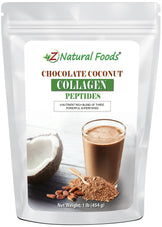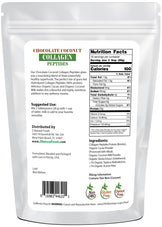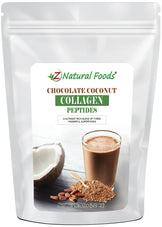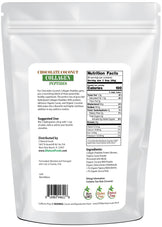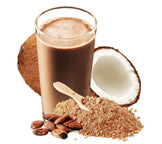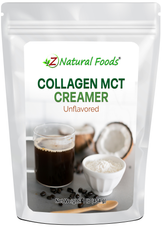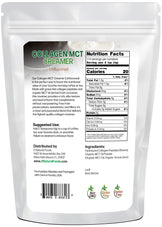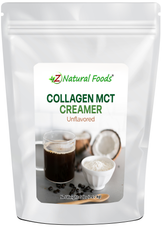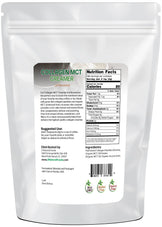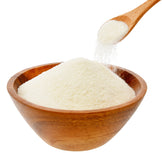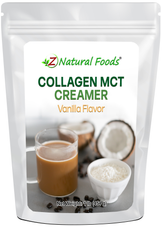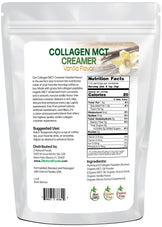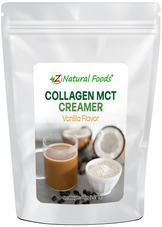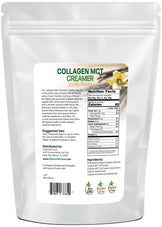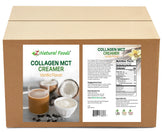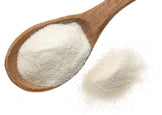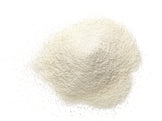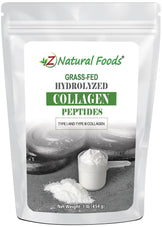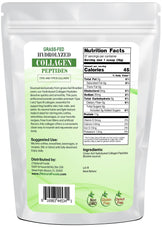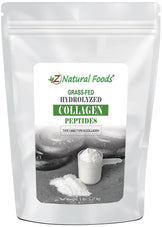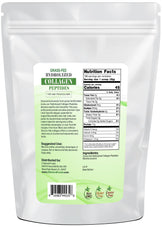Description
Description
Collagen is the most dominant protein in the human body. It is the main structural protein present in the skin, muscles, bones, intestinal linings, tendons, and ligaments.
Collagen is made from four amino acids and grouped to form a collage. These amino acids are hydroxyproline, glycine, proline, and lysine.
Collagen forms a support structure that helps to strengthen organs. Collagen also provides elasticity for the skin and tissues.
The cosmetics industry has taken a fundamental interest in collagen over the recent decades after discovering its capabilities in promoting smooth, wrinkle-free skin and stronger nails and hair. Further, collagen helps maintain strong bones.
Taking collagen peptides provides your body with important amino acids (hydroxyproline, glycine, proline, and lysine). These amino acids form a support structure that strengthens organs and provides elasticity for the skin and connective tissues such as tendons and ligaments.
Some manufacturers use collagen in the production of oils and lotions. Collagen is known for its joint pain-relieving power, among many other benefits.
Collagen And Its Connection To Vitamin And Nutrient Assistance
Collagen peptides are not alone in functioning; they usually require assistance from other vitamins and minerals to function at their best. Vitamin C, for instance, is critical in collagen formation. It stabilizes the structure of collagen and promotes collagen peptide absorption. Vitamin C-rich foods like broccoli, eggs, and citrus fruits may be beneficial in maximizing collagen formation. Adding these nutrients to your diet may enhance the action of collagen supplements and promote bone healing, skin health, and overall well-being.
What are the Benefits of Taking Collagen Peptides?
1) Your skin may get plumper and smoother
Aging induces flabby skin. According to health experts, your skin becomes more delicate as you age because of reduced collagen production. A lack of sufficient collagen in the skin results in the increased formation of wrinkles.
According to an experimental and therapeutic medicine review study conducted in 2020, collagen peptide supplements presented skin-improving capabilities like reducing wrinkle depth among the elderly.
The study also revealed that these supplements might be a solution for dry skin. Avoid smoking, poor dieting, and extended exposure to sunlight to get the most out of the supplements.
2) Supports healthy bones
Osteoporosis is a condition caused by a lack of sufficient vitamin D and calcium levels in the body. Medical experts say collagen may help increase mineral bone density.
Research involving 102 postmenopausal women had 51 of them taking 5 grams of collagen peptides while the rest took a placebo (a non-active substance used as a control in testing new drugs).
After twelve months, researchers noticed an improvement in mineral bone density (especially in the lumbar spine) in the women receiving collagen peptides vs. those receiving the placebo.
3) It may alleviate some signs of osteoarthritis
Osteoarthritis results from the tissue degeneration found in joints (cartilage), and it may also cause the underlying bone to wear out.
During research involving 39 women, the 20 women who received collagen for three months reported less joint pain and increased joint movements than the women who didn’t receive collagen.
4) Muscle density may increase
Collagen constitutes up to 10% of your muscle tissue. However, the muscle mass begins to reduce as age sets in, resulting in a condition known as sarcopenia.
A researcher separated 27 men with poor muscle density into two groups. One group took collagen supplements, the other did not, but both groups conducted three months of exercise.
The men who took collagen supplements had significantly improved muscle density compared to those who didn’t take the supplement.
5) Collagen may support a heart-healthy
Collagen may support strong blood vessels. Healthy blood vessels ensure a steady flow of blood carrying oxygen and nutrients throughout the body.
Low collagen levels, on the other hand, may cause weak vessels. With weak vessels it is possible a person may be at risk of heart conditions, stroke, and other heart-related conditions.
6) Other Benefits of Collagen
Collagen peptides provide numerous additional benefits aside from skin rejuvenation and joint wellness. Supplements have been discovered to promote the following aspects of wellness:
- Hair Growth: Collagen peptides may facilitate hair growth and stop hair thinning by strengthening hair follicles and enhancing the blood supply to the scalp.
- Nail Strength: Ongoing collagen supplementation has been associated with greater, less brittle nails.
- Gut Health: Collagen peptides are also likely to support the gut by enhancing the condition of the intestinal lining and facilitating improved digestion.
- Weight Loss: Collagen peptides may enhance satiety, leading to weight loss by lowering hunger pangs.
Does Collagen Peptides Really Work?
According to a team of researchers, collagen with peptides is more effective when taken orally than applied to the skin.
For oral consumption, collagen peptides are broken into tinier pieces (hydrolyzed collagen peptides) to dissolve in both hot and cold liquids.
Collagen exists in 29 different types in the human body. However, supplements usually only include three types:
- Type I: found in abundance in bones, tendons, ligaments, and skin.
- Type II: supplements source it from chicken bone and cartilage.
- Type III: present in blood vessels, organs, and the skin.
Doctor's Recommendation for Collagen Supplementation
Studies on collagen supplements, especially for skin health, present encouraging results. A meta-analysis of 19 trials on 1,125 subjects demonstrated enhanced skin firmness, elasticity, moisture and lessened wrinkles. Nevertheless, the precise contribution of collagen remains uncertain since most supplements incorporate other substances such as vitamins, minerals, and antioxidants. Several small-scale randomized controlled trials have indicated that collagen peptides may enhance skin hydration, repair, and elasticity and decrease roughness. Still, larger studies are required to establish long-term safety and efficacy.
There is not much evidence for hair and nails. One small 2017 study demonstrated that collagen supplementation enhanced nail brittleness and growth, but the study did not have a placebo control group, so the findings are less convincing. No significant medical evidence to date supports assertions that collagen drinks or supplements can promote hair growth, thickness, or luster.
How Long Does it Take for Collagen Peptides to Work?
Collagen peptides are generally fast-acting, absorbing into your bloodstream, and getting to work on your collagen within the hour. But there’s a massive difference between starting to work and seeing visible results. Most people will only begin to experience the effects after three months of taking collagen peptides daily.
As an adult, try taking a daily dose of 2.5 and 10 grams of collagen to supplement your diet.
Moreover, there are plenty of flavors, such as Chocolate Coconut Collagen Peptides, Berry Punch Collagen Peptides, Vanilla Flavored Collagen MCT Creamer, and even Unflavored Hydrolyzed Collagen Peptides that you can add to your morning smoothie or coffee for blistering absorption speeds.
Other products containing healthy hydrolyzed collagen peptides include Bone Broth powder, Turmeric Bone Broth powder, and Instant Bone Broth Soup Base powder.
Visit the Z Natural Foods website today for the best selection of products with high levels of collagen peptides.
Please visit Z Natural Foods’ Grass-fed Hydrolyzed Collagen Peptides product description for more information about collagen peptides.
Frequently Asked Questions About Collagen
What are the best ways to take collagen peptides?
Collagen peptides can be taken in various forms, including powder, capsules, or liquid. They can easily be added to smoothies, coffee, or water, making them convenient for daily use.
How long does it take to see results from collagen supplementation?
Though outcomes may differ, most individuals start noticing significant improvements in skin hydration and joint comfort after 4 to 6 weeks of regular collagen supplementation.
Are there any side effects of collagen peptides?
Collagen peptides are generally well-tolerated with few side effects. Some people may develop mild gastrointestinal upset or allergic reactions, especially if they are sensitive to the source animal (e.g., fish or bovine collagen). Always consult a physician before initiating supplementation.
References
- Mayo Clinic Q and A: Collagen and biotin supplements. August 2021. Mayo Clinic
- Beneficial effects of food supplements based on hydrolyzed collagen for skincare (Review). July 2020. National Center for Biotechnology Information (NCBI)
- Effects of Collagen Fluctuations. December 2014. Journal of Medical Nutrition and Nutraceuticals
- Specific Collagen Peptides Improve Bone Mineral Density and Bone Markers in Postmenopausal Women—A Randomized Controlled Study. January 2018. NCBI
- Effects of Native Type II Collagen Treatment on Knee Osteoarthritis: A Randomized Controlled Trial. June 2016. Eurasian Journal of Medicine
- Oral intake of specific bioactive collagen peptides reduces skin wrinkles and increases dermal matrix synthesis. December 2013. PubMed.gov Significant Amounts of Functional Collagen Peptides Can Be Incorporated in the Diet While Maintaining Indispensable Amino Acid Balance. May 2019. NCBI



